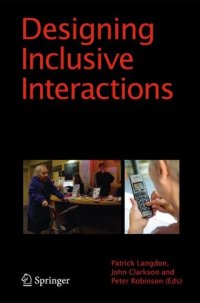
Ebook: Designing Inclusive Interactions: Inclusive Interactions Between People and Products in Their Contexts of Use
Author: P. Biswas P. Robinson (auth.) Patrick Martin Langdon Peter John Clarkson Peter Robinson (eds.)
- Tags: Engineering Design, Biomedical Engineering, Computer-Aided Engineering (CAD CAE) and Design, User Interfaces and Human Computer Interaction, Control Robotics Mechatronics, Rehabilitation
- Year: 2010
- Publisher: Springer-Verlag London
- Edition: 1
- Language: English
- pdf
Designing Inclusive Interactions responds to the recent changes in the research landscapes in the fields of Human Computer Interaction, Computer Science, and Healthcare as a result of new technology and innovation. Research into accessibility for interface design has always represented an unconventional, multi-disciplinary arena of pragmatic disciplines, such as experimental psychology, engineering design, and rehabilitation practice. It has moved from isolated activities in disparate fields to the more interdisciplinary perspective evident today in areas such as healthcare and inclusive design. As a result of this, there is now a need for the transfer of knowledge and techniques from inclusive design research into the wider community. This book is divided into five areas: • Understanding Users for Inclusive Design • Measuring Inclusion • Inclusive Interaction • Assistive Technology • Inclusion and Healthcare The papers were selected by reference to the peer assessments of an international panel of reviewers from many key disciplines such as computer science, assistive technology, engineering and product design. This book represents a sample of leading national and international research in the fields of inclusive design, universal access, and assistive and rehabilitative technology. We hope that this will encourage inter-disciplinary research leading to better designs, effectively reducing exclusion and difficulty, in the workplace, at home and at leisure.
Designing Inclusive Interactions contains the proceedings of the fifth Cambridge Workshop on Universal Access and Assistive Technology (CWUAAT), incorporating the 8th Cambridge Workshop on Rehabilitation Robotics, held in Cambridge, England, in March 2010. It contains contributions from an international group of leading researchers in the fields of Universal Access and Assistive Technology.
Although the book will be divided into four main parts yet to be named, this conference will mainly focus on the following principal topics:
1. Designing assistive and rehabilitation technology for working and daily living environments
2. Measuring inclusion for the design of products for work and daily living
3. Inclusive interaction design and new technologies for inclusive design
4. Assembling new user data for inclusive design
5. The design of accessible and inclusive contexts: work and daily living environments
6. Business advantages and applications of inclusive design
7. Legislation, standards and government awareness of inclusive design
Reflecting the spirit of recent moves to extend rights to equitable participation in society for all, this series of workshops and accompanying books is aimed at a broad range of interests, with a general focus on the development of products and solutions. Numerous case studies and examples of good practice are used to raise awareness of the challenges faced in developing truly inclusive products.